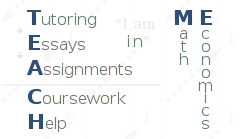Section 67: Problem 4 Solution
Working problems is a crucial part of learning mathematics. No one can learn topology merely by poring over the definitions, theorems, and examples that are worked out in the text. One must work part of it out for oneself. To provide that opportunity is the purpose of the exercises.
James R. Munkres
The order of an element
of an abelian group
is the smallest positive integer
such that
, if such exists; otherwise, the order of
is said to be infinite. The order of
thus equals the order of the subgroup generated by
.
(a) Show the elements of finite order in
form a subgroup of
, called its torsion subgroup.
(b) Show that if
is free abelian, it has no elements of finite order.
(c) Show the additive group of rationals has no elements of finite order, but is not free abelian. [Hint: If
is a basis, express
in terms of this basis.]
According to the definition,
has order
. Hence, in (b) it is assumed that the element is not
.
(a) If
and
have finite orders, then
for some
, and
.
(b) If
for some
, then let
, then
, which in the free abelian group implies that
for all
, hence,
. So, the only element of
that has a finite order is
.
(c) If
for
, then
. Further, using the hint,
implies
implies
, which is not possible.
